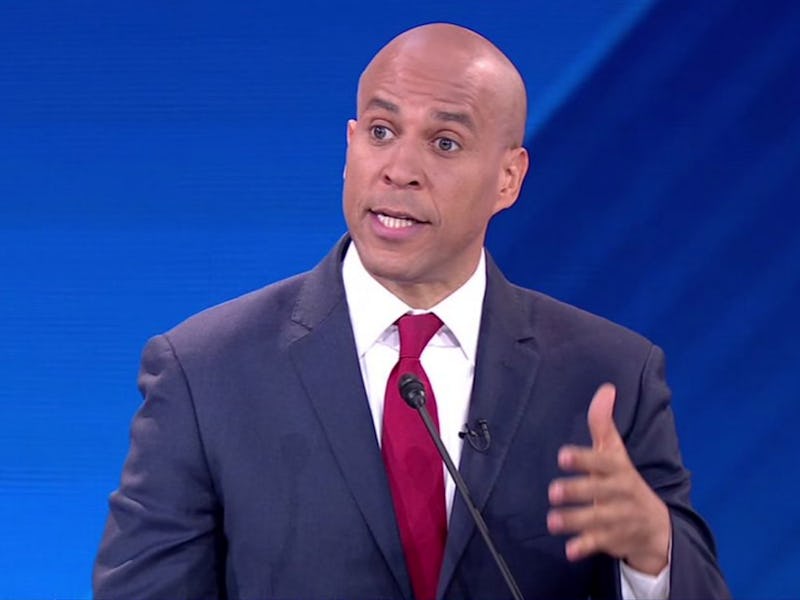Could Vegans Stop the Climate Crisis? Democrats Debate the Issue of Meat
"Factory farming is destroying and hurting our environment."

The third Democratic presidential debate, and the first to include all 10 leading candidates, began on Thursday at 8 p.m. Eastern. By 9:30 p.m. viewers began to question whether or not the climate crisis, a high priority topic for voters, would be meaningfully discussed at all. But as the clock pushed past 10 p.m. a climate-connected question finally came — one not about the Green New Deal, or even the Blue New Deal, but about eating meat.
And while the climate crisis was spliced into earlier segments by the candidates, it never took the spotlight. In his opening statement, Julian Castro said he would prioritize creating clean energy jobs, while Senator Bernie Sanders emphasized in his own introduction that the United States must address the “conflict of climate change” and step away from fossil fuels.
Neither would be called on later to answer questions about the climate crisis. That was especially notable to viewers looking to hear something specifically about the Green New Deal, which Sanders supports. Instead, moderator and journalist Jorge Ramos asked Senator Cory Booker the first climate crisis question of the evening:
Ramos: Let me ask you about Brazil. After the recent fires in the Amazon, some experts suggest that eating less meat is one way to help the environment. You are a vegan since 2014, that’s obviously a personal choice. But President Trump and Brazil’s President Bolsonaro are concerned that climate change regulations could affect economic growth. So should more Americans, including those here in Texas and Iowa, follow your diet?
After a big laugh from the crowd, Booker replied:
First of all, I want to say no. I want to translate that into Spanish: No. Let’s just be clear: The factory farming that’s assaulting this corporate consolidation of the agriculture industry — one of the reasons that I have a bill to put a moratorium on this sort of corporate consolidation is because this factory farming is destroying and hurting our environment. You see independent family farmers being pushed out of business because of the kind of incentives we are giving that don’t line up with our values. That’s what I am calling for.
There’s a lot going on there, so let’s break it down. Booker appears unwilling to say that the catalyst of his veganism is environmentalism, or recommend veganism to the United States at large. But to go back to the intention behind Ramos’ question: Is giving up meat a good way to help the environment?
It depends on who you’re asking. According to a 2018 study released in Nature a “flexitarian” diet is needed to keep climate change under 2 degrees Celsius. That means the average world citizen needs to eat 90 percent less pork, 75 percent less beef, and half the number of eggs.
Meanwhile, in the special report on climate change and land the Intergovernmental Panel on Climate Change (IPCC) released this August, the authors also say eating less meat is a major opportunity for mitigating and adapting to climate change. The IPPC report states that if dietary changes are made now, by 2050 those changes could lead to a reduction in global CO^^2 emissions by up to 8 billion tonnes per year.
So, Booker could have said with confidence that eating less meat is good for the environment, much like Senator Kamala Harris said reducing red meat consumption is an overall good idea during the CNN climate change town hall.
But despite his evasiveness, Booker and the IPCC report still share something important in common: Both agree factory farming is hurting the environment. The IPCC report states that, within the world of agriculture, industrial farming practices are what drives soil erosion, soil pollution, and carbon emissions. This is a point small farm ranchers make as well: They argue that following the message “eat less meat” doesn’t fix the larger problem of industrial farming.
When former US Representative Beto O’Rourke was asked his own climate change question — What meaningful action would he take to reverse the effects of climate change? — he also folded agriculture into his answer, albeit in a different way. His plan involves paying “farmers for the environmental services that they want to provide.” These services could include planting cover crops, carbon sequestration, and using no-till farming.
After the factory farming answer, Booker used the rest of his time to switch the topic to veterans’ issues. But for a brief moment, America dipped into food politics and its intrinsic connection to the climate crisis — something that, if the soaring popularity of fake meat is any indication of, is a topic Americans are very interested in. There’s presumably a reason Booker has an Animal Welfare plan as part of his campaign — time will tell if we’ll get to learn about it next time he’s on stage.